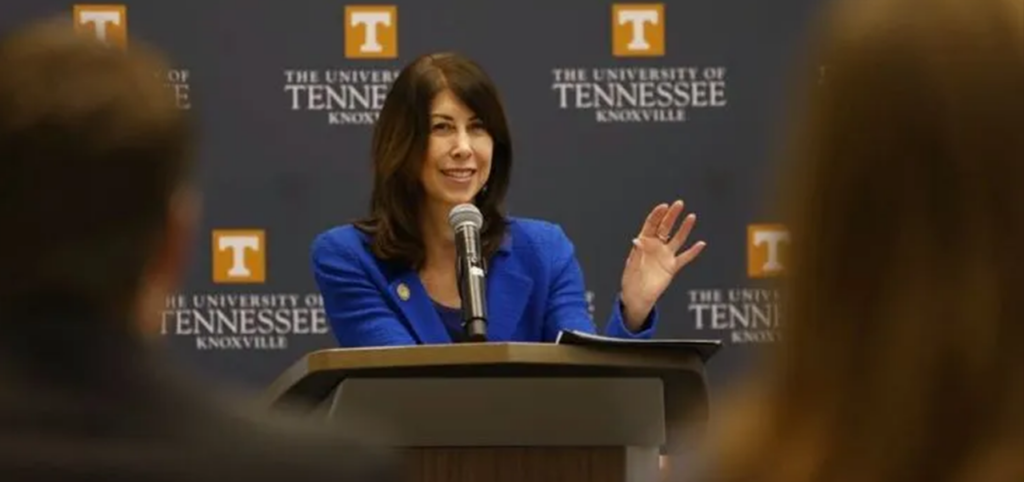The Forensic Anthropology Center at the University of Tennessee, Knoxville, has received two grants totaling over $580,000 from the Office of Justice Program’s National Institute of Justice, the research, development and evaluation agency of the U.S. Department of Justice. A longtime grantee across numerous forensics research topics, the center – which includes the Anthropological Research Facility, also known as the Body Farm – is known worldwide for its research and training.
The first of the two new research projects will help law enforcement locate clandestine graves, and the second will help inform how relic DNA in the soil affects forensic investigations.
The grants were announced during a visit by the NIJ to UT on Dec. 4.
“The University of Tennessee, Knoxville, is a beacon for the field of forensic science research,” said NIJ Director Nancy La Vigne. “Since 2007, NIJ has awarded 26 forensic science research grants to the university, totaling over $6.9 million. I am pleased to announce that NIJ has made two new research awards to the university that will develop essential knowledge that can inform the identification of decedents — information that will ultimately guide investigations, help solve cold cases, support prosecutions, and bring justice to victims and their families.”
It’s the latest example of how the FAC has helped promote forensic science for the betterment of the state, the region and the world.
“For more than three decades, the FAC has generated critical breakthroughs and improvements in forensics research and operations, solidifying its role in helping law enforcement cases and giving families closure,” said Deborah Crawford, UT’s vice chancellor for research, innovation and economic development. “Researchers at the FAC are harnessing the tools of cutting-edge science to address critical forensics challenges – showcasing the creativity and impact of UT Research and exemplifying the Volunteer spirit of service and leadership.”
$351,078 Awarded for ‘Evaluating the Reliability and Accuracy of Multiple Geophysical Methods in the Search for Clandestine Graves’
For the project involving the search for hidden burials, the FAC team will use three different methods of locating graves — ground-penetrating radar, electromagnetic conductivity and magnetometry — under a variety of conditions, including differing terrain.
Their ultimate goal is to provide NIJ with hard data showing which methods are most accurate in a given set of circumstances.
They will also keep track of the time required to set up and break down equipment as well as conducting an analysis of costs associated with each so individual law enforcement agencies can take those factors into account when planning and conducting a search.
Research Associate Mary Davis and Research Associate Professor Giovanna Vidoli are the principal investigators, with Distinguished Lecturer Joanne Devlin and Associate Professor Amy Mundorff serving as investigators.
$229,454 Awarded for ‘Impact of Relic DNA on Forensic Microbiome Applications in Criminal Investigations’
Microbes are useful to investigators in numerous ways, from helping determine the time of death to potentially linking back to a suspect or location if a crime has been committed. The potential exists, however, for a false reading or misunderstanding of the data due to relic DNA that should not have been associated with the burial, and understanding of such DNA and how it affects forensic investigations is not fully understood.
Using tools such as postmortem interval estimation and trace evidence analysis, the FAC is working to gain a better understanding of the process and making recommendations to forensic agencies on best practices surrounding microbes and relic DNA.
Research Assistant Professor Zach Burcham and Alison Buchan, Carolyn W. Fite Professor, are serving as principal investigators with Vidoli as an investigator.
Further Connections to NIJ Projects
Mundorff is part of a third project, which is being led by Bode Technology: “Evaluation of Target Enrichment for SNP Genotyping of Skeletal Remains.” With funding of $659,287, the project is working to improve, enhance and outline best practices for using genotyping when working with skeletal remains.
“There are well-established, validated, practices for SNP Genotyping from recently deceased, fully fleshed human remains. This project seeks to validate these procedures to achieve similar results from skeletonized remains,” said Mundorff, whose research specializes in human identification from skeletonized remains and developing new methodologies for locating clandestine graves.
Mundorff has built a strong history of working with the NIJ, with seven awards — four of them with Bode — dating back to 2010.
—
MEDIA CONTACT:
Tyra Haag (865-974-5460, (tyra.haag@tennessee.edu)
